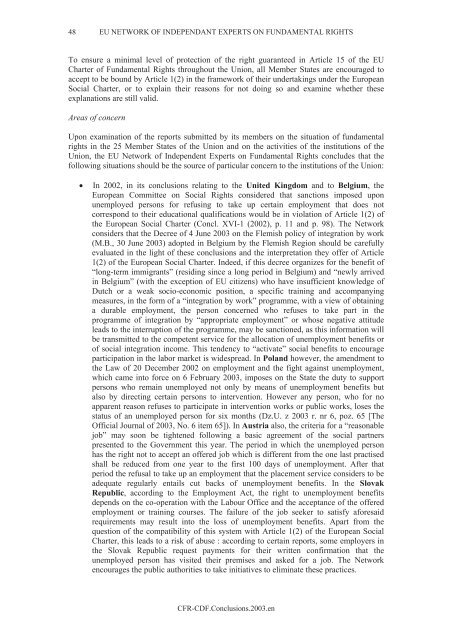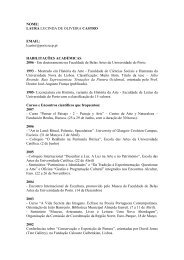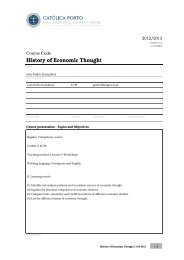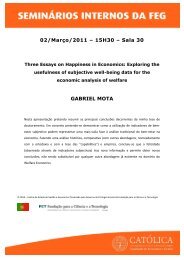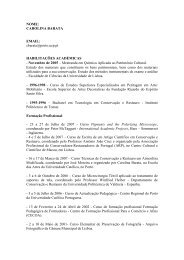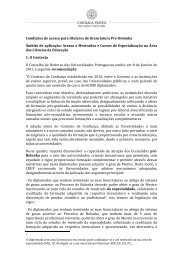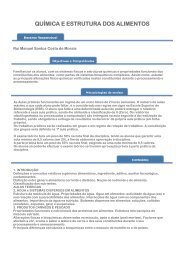eu network of independent experts on fundamental rights (cfr-cdf)
eu network of independent experts on fundamental rights (cfr-cdf)
eu network of independent experts on fundamental rights (cfr-cdf)
You also want an ePaper? Increase the reach of your titles
YUMPU automatically turns print PDFs into web optimized ePapers that Google loves.
48EU NETWORK OF INDEPENDANT EXPERTS ON FUNDAMENTAL RIGHTSTo ensure a minimal level <str<strong>on</strong>g>of</str<strong>on</strong>g> protecti<strong>on</strong> <str<strong>on</strong>g>of</str<strong>on</strong>g> the right guaranteed in Article 15 <str<strong>on</strong>g>of</str<strong>on</strong>g> the EUCharter <str<strong>on</strong>g>of</str<strong>on</strong>g> Fundamental Rights throughout the Uni<strong>on</strong>, all Member States are encouraged toaccept to be bound by Article 1(2) in the framework <str<strong>on</strong>g>of</str<strong>on</strong>g> their undertakings under the EuropeanSocial Charter, or to explain their reas<strong>on</strong>s for not doing so and examine whether theseexplanati<strong>on</strong>s are still valid.Areas <str<strong>on</strong>g>of</str<strong>on</strong>g> c<strong>on</strong>cernUp<strong>on</strong> examinati<strong>on</strong> <str<strong>on</strong>g>of</str<strong>on</strong>g> the reports submitted by its members <strong>on</strong> the situati<strong>on</strong> <str<strong>on</strong>g>of</str<strong>on</strong>g> <strong>fundamental</strong><strong>rights</strong> in the 25 Member States <str<strong>on</strong>g>of</str<strong>on</strong>g> the Uni<strong>on</strong> and <strong>on</strong> the activities <str<strong>on</strong>g>of</str<strong>on</strong>g> the instituti<strong>on</strong>s <str<strong>on</strong>g>of</str<strong>on</strong>g> theUni<strong>on</strong>, the EU Network <str<strong>on</strong>g>of</str<strong>on</strong>g> Independent Experts <strong>on</strong> Fundamental Rights c<strong>on</strong>cludes that thefollowing situati<strong>on</strong>s should be the source <str<strong>on</strong>g>of</str<strong>on</strong>g> particular c<strong>on</strong>cern to the instituti<strong>on</strong>s <str<strong>on</strong>g>of</str<strong>on</strong>g> the Uni<strong>on</strong>:In 2002, in its c<strong>on</strong>clusi<strong>on</strong>s relating to the United Kingdom and to Belgium, theEuropean Committee <strong>on</strong> Social Rights c<strong>on</strong>sidered that sancti<strong>on</strong>s imposed up<strong>on</strong>unemployed pers<strong>on</strong>s for refusing to take up certain employment that does notcorresp<strong>on</strong>d to their educati<strong>on</strong>al qualificati<strong>on</strong>s would be in violati<strong>on</strong> <str<strong>on</strong>g>of</str<strong>on</strong>g> Article 1(2) <str<strong>on</strong>g>of</str<strong>on</strong>g>the European Social Charter (C<strong>on</strong>cl. XVI-1 (2002), p. 11 and p. 98). The Networkc<strong>on</strong>siders that the Decree <str<strong>on</strong>g>of</str<strong>on</strong>g> 4 June 2003 <strong>on</strong> the Flemish policy <str<strong>on</strong>g>of</str<strong>on</strong>g> integrati<strong>on</strong> by work(M.B., 30 June 2003) adopted in Belgium by the Flemish Regi<strong>on</strong> should be carefullyevaluated in the light <str<strong>on</strong>g>of</str<strong>on</strong>g> these c<strong>on</strong>clusi<strong>on</strong>s and the interpretati<strong>on</strong> they <str<strong>on</strong>g>of</str<strong>on</strong>g>fer <str<strong>on</strong>g>of</str<strong>on</strong>g> Article1(2) <str<strong>on</strong>g>of</str<strong>on</strong>g> the European Social Charter. Indeed, if this decree organizes for the benefit <str<strong>on</strong>g>of</str<strong>on</strong>g>“l<strong>on</strong>g-term immigrants” (residing since a l<strong>on</strong>g period in Belgium) and “newly arrivedin Belgium” (with the excepti<strong>on</strong> <str<strong>on</strong>g>of</str<strong>on</strong>g> EU citizens) who have insufficient knowledge <str<strong>on</strong>g>of</str<strong>on</strong>g>Dutch or a weak socio-ec<strong>on</strong>omic positi<strong>on</strong>, a specific training and accompanyingmeasures, in the form <str<strong>on</strong>g>of</str<strong>on</strong>g> a “integrati<strong>on</strong> by work” programme, with a view <str<strong>on</strong>g>of</str<strong>on</strong>g> obtaininga durable employment, the pers<strong>on</strong> c<strong>on</strong>cerned who refuses to take part in theprogramme <str<strong>on</strong>g>of</str<strong>on</strong>g> integrati<strong>on</strong> by “appropriate employment” or whose negative attitudeleads to the interrupti<strong>on</strong> <str<strong>on</strong>g>of</str<strong>on</strong>g> the programme, may be sancti<strong>on</strong>ed, as this informati<strong>on</strong> willbe transmitted to the competent service for the allocati<strong>on</strong> <str<strong>on</strong>g>of</str<strong>on</strong>g> unemployment benefits or<str<strong>on</strong>g>of</str<strong>on</strong>g> social integrati<strong>on</strong> income. This tendency to “activate” social benefits to encourageparticipati<strong>on</strong> in the labor market is widespread. In Poland however, the amendment tothe Law <str<strong>on</strong>g>of</str<strong>on</strong>g> 20 December 2002 <strong>on</strong> employment and the fight against unemployment,which came into force <strong>on</strong> 6 February 2003, imposes <strong>on</strong> the State the duty to supportpers<strong>on</strong>s who remain unemployed not <strong>on</strong>ly by means <str<strong>on</strong>g>of</str<strong>on</strong>g> unemployment benefits butalso by directing certain pers<strong>on</strong>s to interventi<strong>on</strong>. However any pers<strong>on</strong>, who for noapparent reas<strong>on</strong> refuses to participate in interventi<strong>on</strong> works or public works, loses thestatus <str<strong>on</strong>g>of</str<strong>on</strong>g> an unemployed pers<strong>on</strong> for six m<strong>on</strong>ths (Dz.U. z 2003 r. nr 6, poz. 65 [TheOfficial Journal <str<strong>on</strong>g>of</str<strong>on</strong>g> 2003, No. 6 item 65]). In Austria also, the criteria for a “reas<strong>on</strong>ablejob” may so<strong>on</strong> be tightened following a basic agreement <str<strong>on</strong>g>of</str<strong>on</strong>g> the social partnerspresented to the Government this year. The period in which the unemployed pers<strong>on</strong>has the right not to accept an <str<strong>on</strong>g>of</str<strong>on</strong>g>fered job which is different from the <strong>on</strong>e last practisedshall be reduced from <strong>on</strong>e year to the first 100 days <str<strong>on</strong>g>of</str<strong>on</strong>g> unemployment. After thatperiod the refusal to take up an employment that the placement service c<strong>on</strong>siders to beadequate regularly entails cut backs <str<strong>on</strong>g>of</str<strong>on</strong>g> unemployment benefits. In the SlovakRepublic, according to the Employment Act, the right to unemployment benefitsdepends <strong>on</strong> the co-operati<strong>on</strong> with the Labour Office and the acceptance <str<strong>on</strong>g>of</str<strong>on</strong>g> the <str<strong>on</strong>g>of</str<strong>on</strong>g>feredemployment or training courses. The failure <str<strong>on</strong>g>of</str<strong>on</strong>g> the job seeker to satisfy aforesaidrequirements may result into the loss <str<strong>on</strong>g>of</str<strong>on</strong>g> unemployment benefits. Apart from thequesti<strong>on</strong> <str<strong>on</strong>g>of</str<strong>on</strong>g> the compatibility <str<strong>on</strong>g>of</str<strong>on</strong>g> this system with Article 1(2) <str<strong>on</strong>g>of</str<strong>on</strong>g> the European SocialCharter, this leads to a risk <str<strong>on</strong>g>of</str<strong>on</strong>g> abuse : according to certain reports, some employers inthe Slovak Republic request payments for their written c<strong>on</strong>firmati<strong>on</strong> that th<str<strong>on</strong>g>eu</str<strong>on</strong>g>nemployed pers<strong>on</strong> has visited their premises and asked for a job. The Networkencourages the public authorities to take initiatives to eliminate these practices.CFR-CDF.C<strong>on</strong>clusi<strong>on</strong>s.2003.en


